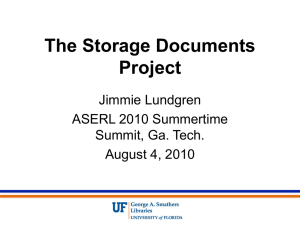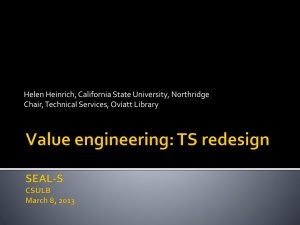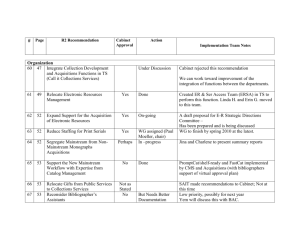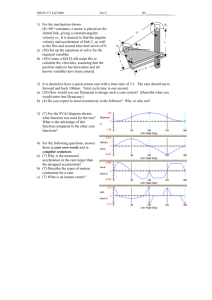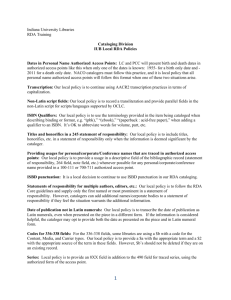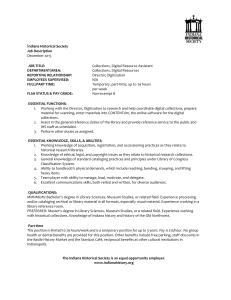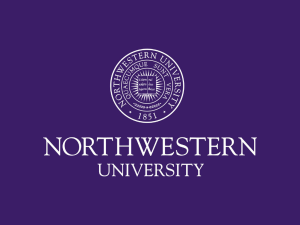Content Access Management Unit Annual Report Submitted on August 19, 2013
advertisement
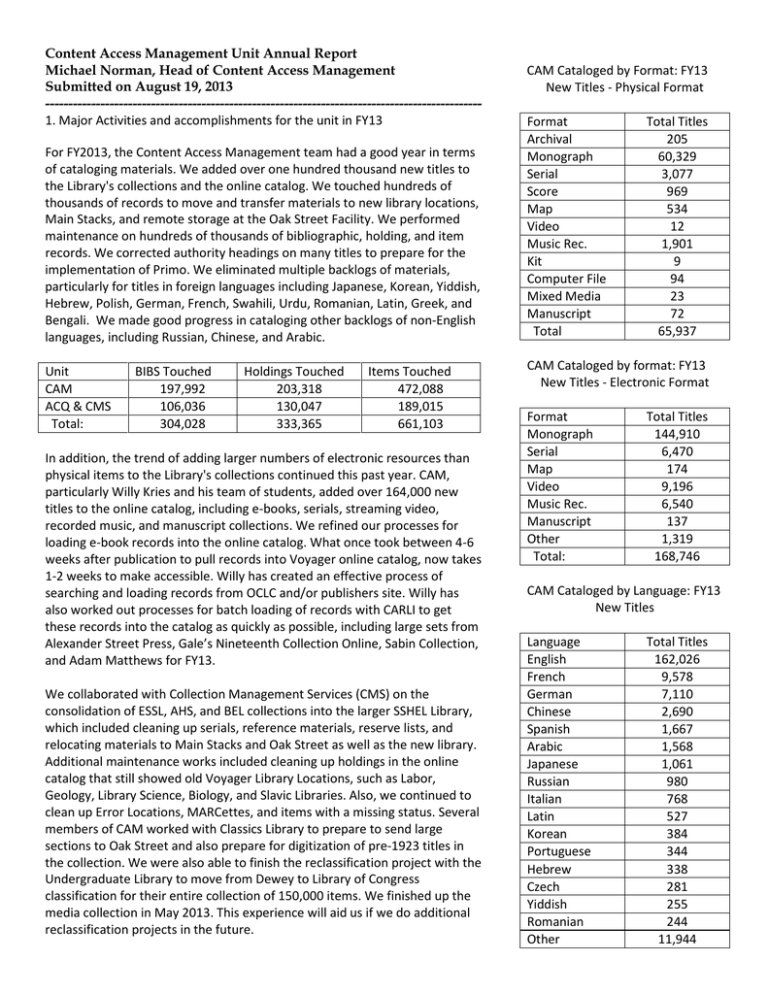
Content Access Management Unit Annual Report Michael Norman, Head of Content Access Management Submitted on August 19, 2013 ----------------------------------------------------------------------------------------------1. Major Activities and accomplishments for the unit in FY13 For FY2013, the Content Access Management team had a good year in terms of cataloging materials. We added over one hundred thousand new titles to the Library's collections and the online catalog. We touched hundreds of thousands of records to move and transfer materials to new library locations, Main Stacks, and remote storage at the Oak Street Facility. We performed maintenance on hundreds of thousands of bibliographic, holding, and item records. We corrected authority headings on many titles to prepare for the implementation of Primo. We eliminated multiple backlogs of materials, particularly for titles in foreign languages including Japanese, Korean, Yiddish, Hebrew, Polish, German, French, Swahili, Urdu, Romanian, Latin, Greek, and Bengali. We made good progress in cataloging other backlogs of non-English languages, including Russian, Chinese, and Arabic. Unit CAM ACQ & CMS Total: BIBS Touched 197,992 106,036 304,028 Holdings Touched 203,318 130,047 333,365 Items Touched 472,088 189,015 661,103 In addition, the trend of adding larger numbers of electronic resources than physical items to the Library's collections continued this past year. CAM, particularly Willy Kries and his team of students, added over 164,000 new titles to the online catalog, including e-books, serials, streaming video, recorded music, and manuscript collections. We refined our processes for loading e-book records into the online catalog. What once took between 4-6 weeks after publication to pull records into Voyager online catalog, now takes 1-2 weeks to make accessible. Willy has created an effective process of searching and loading records from OCLC and/or publishers site. Willy has also worked out processes for batch loading of records with CARLI to get these records into the catalog as quickly as possible, including large sets from Alexander Street Press, Gale’s Nineteenth Collection Online, Sabin Collection, and Adam Matthews for FY13. We collaborated with Collection Management Services (CMS) on the consolidation of ESSL, AHS, and BEL collections into the larger SSHEL Library, which included cleaning up serials, reference materials, reserve lists, and relocating materials to Main Stacks and Oak Street as well as the new library. Additional maintenance works included cleaning up holdings in the online catalog that still showed old Voyager Library Locations, such as Labor, Geology, Library Science, Biology, and Slavic Libraries. Also, we continued to clean up Error Locations, MARCettes, and items with a missing status. Several members of CAM worked with Classics Library to prepare to send large sections to Oak Street and also prepare for digitization of pre-1923 titles in the collection. We were also able to finish the reclassification project with the Undergraduate Library to move from Dewey to Library of Congress classification for their entire collection of 150,000 items. We finished up the media collection in May 2013. This experience will aid us if we do additional reclassification projects in the future. CAM Cataloged by Format: FY13 New Titles - Physical Format Format Archival Monograph Serial Score Map Video Music Rec. Kit Computer File Mixed Media Manuscript Total Total Titles 205 60,329 3,077 969 534 12 1,901 9 94 23 72 65,937 CAM Cataloged by format: FY13 New Titles - Electronic Format Format Monograph Serial Map Video Music Rec. Manuscript Other Total: Total Titles 144,910 6,470 174 9,196 6,540 137 1,319 168,746 CAM Cataloged by Language: FY13 New Titles Language English French German Chinese Spanish Arabic Japanese Russian Italian Latin Korean Portuguese Hebrew Czech Yiddish Romanian Other Total Titles 162,026 9,578 7,110 2,690 1,667 1,568 1,061 980 768 527 384 344 338 281 255 244 11,944 Regarding metadata creation work, MJ Han continued her good work in this area, leading a team of academic hourly and student employees to create and enhancement our metadata records for our non-MARC cataloging. She worked diligently to automate processes for getting materials from Internet Archive and Google Digitization project into HathiTrust, She also worked to include Brittle Book titles into that workflow. We also worked with University of Illinois campus legal team to make the metadata created from our original cataloging work to be available through CC0 (Creative Commons Zero) agreement. The records we are making available include metadata for items we have digitized locally through the Internet Archive. We provide the metadata as MARC, MARCXML, and RTF triples (linked data). MJ is also leading a project to work with millions of authority records provided by OCLC to create linked data processes to enhance our existing authority headings in Voyager and Primo. Hopefully this will be work we can share with others as we look to partner with Stanford and Library of Congress to incorporate this into the ongoing BibFrame work. Another big project we have been working on is the cleanup work of getting all our digitized titles through the Google Digitization project into the online catalog, particularly the nearly one hundred thousand U.S. Federal Government documents we contributed as a Library. MJ has automated this process for contributing items digitized with the Internet Archive into our online catalog and also OCLC WorldCat. The implementation Primo, the web-scale discovery system, has been a major undertaking for Content Access Management for FY2013. Michael Norman was named as technical lead for the implementation and co-led the project with Jenny Emanuel as public services lead. Thousands of hours were put in to learn the back end office work to get Primo up and working properly. We went live with Primo in October 2012 and live to the public in February 2013. Customization of the interface was completed with considerable work by Josh Bishoff, Jay Heldreth, Robert Slater, and Bill Mischo to incorporate the recommending services of the custom tile (pulled over in most cases from Easy Search programming) into the search results returned by Primo. Collections were activated in the system. Over a dozen information sessions to update the Library on use of Primo occurred in FY2013. William Weathers was hired as Visiting Metadata Librarian for Web Scale Discovery in August 2012 and he did tremendous work to pull the metadata records into the Primo indexes. This marks the first time we have been able to incorporate our non-MARC metadata collections into our MARC catalog record collections. William was able to add records from IDEALS, ContentDM, and LibGuides into the Primo index and integrate into the encompassing searches with the UIUC Online Catalog, Primo Central Index (hundreds of millions of journal articles), the SFX journal and databases complete list, and the University of Illinois created digital content. Work is ongoing to pull Archon and the Library's special collections materials in the Primo indexes and getting all the Library's collections represented in the web scale discovery system. We are still in the process of cleaning up large sets of our records to correct authority headings errors and incorrect holdings data show it follows national standards and displays properly to users. We are still working to see if web-scale discovery systems are in the Library's best interests, including if blending the Library's physical and print formats in with our electronic resources collections, and CAM will work with others in the Library to determine the best path forward in regards to best options for search and discovery for the Library's user community. Other important achievements in CAM: MJ Han got tenure May 2013 Hiring of Nicole ReamSotomayor to help coordinate foreign language cataloging White Paper on Foreign Language cataloging – Finished in June 2013 by Atoma Batoma, Marek Sroka, Janet Weber, Nicole Ream-Sotomayor Working with CIC on U.S. Federal Government publications, union list, determine who has copies to digitize; work with University of Minnesota to incorporate State of Michigan’s collection into their catalog; send duplicates to Google Worked with the CARLI consortia to load over 1.1 million records for public domain titles available in HathiTrust. Continuing to work with them to update with new records and correct titles that have errors or no longer provide access to full-text content Overhaul of the CAM webpage, reviewing and updating our documentation and tutorials for easier access to anyone interested our local cataloging practices and policies. We have added new sections on RDA and LC classification Contributed to working with Springer publisher to identify set of titles for the Library to supply for digitization. We will contribute nearly 2,000 titles. For FY2013, CAM provided many training sessions to the Library, both for internal cataloging and authority work but also for the Library's public services personnel. Janet Weber set up weekly sessions to help train CAM, Acquisitions, and Collections Management Services staff immerses themselves in learning the Library of Congress classification system. To ensure capacity, over twenty catalogers participated were trained in utilizing LC or Dewey classification depending on where in the Library's collection would reside. This work also helped with the reclassification projects going on in FY2013 in Undergraduate Library and International and Area Studies Library. CAM has hosted several Library-wide information sessions to give more information about the basics of LC Classification and best strategies for searching our online catalogs by LC Call Numbers. The documents and power point presentations were accessed and downloaded over 100 times. Also, the CAM team undertook a big effort to incorporate the RDA standard into our original cataloging work. All news records created as of February 2013 was to use the RDA Standard. Qiang Jin contributed many information sessions regarding RDA training for CAM, Technical Services units, and also for public service groups. A small team (Qiang Jin, Atoma Batoma, Marek Sroka, David Griffiths, Jianying Shou, Martha Degutis, Robin Hess, and Janet Weber) was formed to create our best practices and policies for utilizing RDA and to disseminate the information out to the Library. The team did great work in smoothly migrating us over to the new standard and making sure we can work with either AACR2 or RDA records whenever encountered in daily workflows. Qiang Jin also gathered all this information on the CAM website, making it easy to consult when needed. Our RDA section has had thousands of visits within the library but also many visits from individuals in the State of Illinois and also around the world. It has become a useful tool in teaching and learning about RDA. A large effort has also been put into update the CAM website to make it easier to find local policies and practices for cataloging the various materials and formats at the Library. We were informed by many it was not always easy to find instructions on call number construction or some of the local conventions we have in cataloging or shelflisting of our materials. Also, it has not been intuitive as whom to contact n CAM with an issue or problem. We have worked to make that better. In addition, we have added more information regarding foreign language cataloging and authority heading creation for NACO and how to do this under RDA standards now. For CAM, FY2013 was another product year, with many new initiatives added to the normal workflows and processes. We accomplished a great deal in terms of items cataloged but also dealing with the many other aspects involved in the digital presence of the University of Illinois Library moving forward 2. Review the major challenges faced by the unit during that period; In FY2013, the major challenges for the Content Access Management team were making sure we had enough people to get the day-to-day work completed. We continue to lose individuals working in original cataloging and serials cataloging. With the departures, we have used academic hourly employees to help get the worked completed. After a period of training, they usually provide sufficient help in providing cataloging of foreign language materials and difficult formats like maps, media or scores. We are almost in a constant state of training and monitor the work until individual catalogers are ready to do work without review. Having hourly employees have given us the flexibility to hire individuals with language proficiencies that we don’t have on staff. It has allowed us to eliminate several backlogs of particular languages that had been around for many years. So, the Cam unit will continue to need that flexibility to deal with materials in languages we cannot work with in our day-to-day action. But, having a few more permanent staff to work in these difficult areas would be helpful In addition to working with foreign language materials, we still don’t have enough people working on our digital and electronic resources. The majority of the Library’s budget is going to purchase electronic resources. We are digitizing large numbers of titles. But, we are struggling to produce the metadata associated with these titles and also making sure we continue to maintain and enhance these records over time. We have made significant progress with cataloging and representing our e-book collections in the online catalog. Willy Kries has been here for over 18 months and is hitting his stride in figuring out the best ways to keep our e-book titles up-to-date and accurate in the catalog, as these url links to full text content is still constantly changing (see Gale change in the syntax of urls in record sets for Eighteenth Century Collections Online, Making of the Modern World, Making of Modern Law, etc.). We have made good progress in making our digitized content accessible to users from the automation of loading records that MJ Han has put in place. But, we need to be able to do some of this same work for our e-serial collections, the University of Illinois theses and dissertations collections, the monographic series e-collections, and the thousands of conference proceedings we get access to each year. It is not as easy to find these materials. We need to move more of our permanent staff over to working on these collections, automate and mechanize the regular and routine and have employees in CAM work more on the electronic content. That is one of our major problems we have encountered this past year. In conjunction with the e-serials cataloging issues, for several years now, since we lost Fang Gao to employment at GPO, we have not had an individual total devoted to serials cataloging, overseeing the daily work, and really thinking about the intricacies of cataloging serials, both print and electronic formats. Working with serials almost always needs to someone thinking through the serials on both a micro and macro level. Many errors and mistakes have made it the display of serial records. Also, many of our records still don’t conform to national standards and this makes our records not display correctly in VuFind or Primo versions of our online catalogs. Some data does not show at all in the public display. We have critical mass with this in the Library. Many people in the Library are complaining about the issues with serials. To deal with these issues, a major project needs to occur to get these records up-to-date, including information in the holding and item records. We want to make sure it is easy to determine exactly what the Library holds for our print serials titles as we have one of the richest collections in the world. And, then just as easily determine what we have in electronic format as well. We still have work to do in both those areas. For the CAM team, we have a good team in place to deal with any contingent we encounter. We have built up a good group of leaders within CAM, including MJ Han, Janet Weber, Willy Kries, and Nicole Ream-Sotomayor, who are always working to make our processes and workflows as efficient and effective as possible. They are working with both permanent staff and temporary hourly employees to make sure the day-to-day work in original cataloging, foreign language cataloging, electronic resources, database maintenance, and metadata creation is done in as timely a manner as possible. Quality is also important is this equation, making sure we produce accurate and current access points to all we catalog. The challenge is to automate the routine and normal and devote more people to the special and unique (following national standards) to optimize the sharing of data and records. We need to figure out how best to combine the two elements , working with both permanent and temporary employees to effectively deal with all the cataloging work that needs to get completed in an appropriate amount of time. 3. Identify Significant changes to unit operations, personnel, service profile, or service programs There were not many significant changes to the unit operation in FY2013. We had another year to acclimate Asian Library cataloging operations into our normal workflows and processes. Through the enormous efforts of CMS, we were able to eliminate large backlogs of materials in Chinese, Japanese, Korean, Arabic, and Hindi languages. We are working to implement better ways of keeping current with these collections. We have integrated the Asian languages cataloging into the regular workflows in both Acquisitions and CAM, with much of the copy cataloging occurring in Acquisitions and the original and complex moving to CAM for completion. We have been able to hire new hourly employees to help in these areas. We were able to hire Nicole Ream-Sotomayor in December 2012 to help coordinate our non-English, foreign language cataloging through all Technical Services units. She has made good progress through June 2013 and more details for our future plans will be included in the goals for FY2014. So, pulling in Nicole to help with better coordination of all our foreign language materials is already seeing benefits and will continue to improve over the next year. Database maintenance projects have been sporadic in the past and under the leadership of MJ Han and Janet Weber, a team within CAM and Acquisitions, has been formed to expedite the important work of consistently cleaning up our bibliographic records, holdings data, changing Voyager location information, and maintaining correct item statuses in Voyager and VuFind catalogs. This has been the biggest changes in regards to changes in the unit operations, being able to pull a good group of people into the management of the CAM unit. This should continue into this next year and we become more comfortable with having these smaller groups work to improve long standing situations. 4. Articulate (with appropriate examples) the ways in which the unit and/or its members contributed to Library-wide programs, including information services, instructional services, scholarly communications, assessment, collection management, digital content creation, staff training, and development, diversity efforts, and public engagement The narrative sections above highlight many of the Library-wide programs that CAM has played a leading role and participated in over FY2013. We always consider it essential to offer these Library-wide sessions to aid all employees in the University of Illinois Library to better understand our search and discovery system. We want to make it as easy as possible for users and Library staff to discovery and locate the entire Library's collection, in whatever format it is best available to use. We always strive to follow national standards and rules when cataloging any materials or resource to add to our search and discovery systems. The vital component to that is consistently have information sessions to the Library to discuss any new developments or to inform any new individuals about how items are best discovered and located in this large library. We were able to lead multiple information sessions about the change to RDA Standards for cataloging, following the Library of Congress move to the new standard in March 2013. We had multiple information sessions on the Library's move to using the Library of Congress Classification system for several department libraries, including SSHEL and new literature materials located in Main Stacks. As more of the Library's collections are cataloged using LC Classification, more of these sessions will need to occur. We continued our practice to have a tour of "A Journey of the Book," for each semester to inform new hires about how a book proceeds through our various workflows and processes. Members of CAM held over a dozen information sessions regarding going live with Primo in the Fall Semester. We had well-attended weekly sessions for Library staff in October, November and December 2012. We had additional information sessions as reminders and to introduce new features and collections as they were added in February and March of 2013. We have also held information sessions on the various online catalogs we currently present to users on the front gateway, comparing the strengths of each system and when it is better to utilize over the others (for example, call number searches cannot occur in VuFind). As we continue to work on web scale discovery and/or our search and discovery systems, we will continue to have these information sessions to inform as many people as we so they can to keep up-to-date and educated on all the work that is going on within the Library. 5. Review progress made on Unit Annual Goals for FY13 There were three major goals in CAM for FY2013. First, better integrate foreign language cataloging, particularly Asian language cataloging into CAM’s regular daily workflows. Working with Acquisitions and Collection Management Services over the past year, we have dealt with many of the large backlogs of materials in Chinese, Japanese, and Korean. Many of these items are now on the shelves. With the hiring of Nicole Ream-Sotomayor, we are continue to work with Acquisitions to improve the management of currently received items in those languages. So, CAM met part of that goal and we are continuing to work to better incorporate these foreign language materials (also including Arabic, Urdu, Persian, and Hindi) into the regular routines of the unit. Second, the goal was to improve access to our electronic books and electronic serials collections, including getting bibliographic into the online catalog faster, alerting Library staff when new collections were added, and providing more accurate and current information about e-serials coverage across all our discovery systems. This is an area were CAM has made good progress in providing better access to the Library’s electronic collections. As mentioned earlier, Willy Kries has made important improvements to discovery new purchases and then pulling the records into the catalog within a few weeks of publication. HE has also spent considerable time making sure our backfiles of e-books are completely represented in the online catalogs. In addition, Willy and his team of students are providing maintenance on thousands of records to get naming conventions the same for each item in a collection. This will allow anyone the ability to easily determine the titles and numbers associated with a particular collection. The third major goal for CAM was provide better training opportunities for the all Technical Services units and others in the Library who does any cataloging work in the Voyager system. We all were encountering new rules and standards with RDA, NACO authority headings, and LC Classification schedules and wanted to make sure the Library was uniform in the records created or enhanced over time. Uniformity is critical to ensure search results are consistent and explainable to our user community. Under the leadership of Janet Weber and Qiang Jin, we reached that goal and helped set up a system to continue offering these training sessions into the future. Keeping everyone on the same page in terms of cataloging and catalog maintenance is the optimal state we want to achieve. Additional work needs to occur to fully implement plans to make sure all employees associated with bibliographic, holdings, or item record work receives sufficient levels of training and monitoring of work, but the work that Janet and Qiang achieved this past year regarding training and documentation of policies, procedures, and practices have helped us build a good foundation for continuing to move forward. 6. Articulate Unit Annual Goals for FY13 Get the cataloging of e-serials into the same successful state we have for e-books. We need to figure out best option to provide access to e-serial titles, full-text coverage, and most effective path to getting to the full text content of each serial title through the myriad of discovery systems we have in the Library. We have access to over 90,000 e-serial titles. There are over 10,000,000 downloads of articles and book chapters per year. So, we are doing something right. But, there are some solutions we can do to make it easier to find these important resources. We received an innovation grant from the Library to create a system that allows CIC Libraries to collaborate on cataloging materials in languages where proficiency does not exist within a library’s ability to do original cataloging in a certain language. With this system, similar to the one we utilize with the MARCNow vendor to catalog our Arabic language materials, the library would post scans of materials where original cataloging is needed. Another CIC library would utilize the scans to produce a MARC record to share with the other libraries. Each CIC Library will submit a list of languages that they have someone on staff who could do the original cataloging for the piece. Instead of playing out the $40 to $50 dollars per item that most cataloging vendor charge for this work, we can pool the work from the various CIC libraries to work on languages one cannot effectively do at the home library. For the University of Illinois Library, this would bring tremendous benefits to getting these materials cataloged that set around in our backlogs. To create and use this system in FY2014 will be a tremendous success and benefit the Library with materials we cannot do much with at this time. Continue to use new technologies and programming to streamline and utilize data for metadata creation within our MARC catalogs and repositories. We need to utilize metadata from wherever it exists and we can harvest to create better and faster access to items we care cataloging. The goal will be to work with Library of Congress, NISO, OCLC, and Ex Libris in their national initiatives to incorporate linked data and semantic web features to produce better search and discovery mechanisms to aid our users find the treasures in the Library. 7. The Number of GAs (FTE and Head Count) employed during FY13 CAM had three graduate assistants for FY2013. Each had an appointment of .33 percent and worked from August 16, 2012 to May 15, 2013. 1) Anthonia Ahonsi (.33 percent appointment, state funds) 2) Muhammad Asrar ul Haq (.33 percent appointment, state funds) 3) Jane Sandberg (.33 percent appointment, state funds) 8. The funding source for the unit's GAs (e.g. state funds, grant funds, endowment funds All three graduate assistants were funded using state funds. 9. The major responsibilities assigned to the GAs in the unit, and an overview of the contributions made (or projects completed) by GAs during the fiscal year. 1) Anthonia Ahonsi – Anthonia main duties in CAM was to provide copy and original cataloging of Africana language materials. She has learned to use all the standard tools and systems we utilize in our day-to-day work for cataloging. She has gained expertise in AACR2, RDA, using OCLC Connexion, Voyager cataloging client, assigning call numbers, subject headings and working with authority records. This experience is needed to become a cataloger at most academic and research libraries. She helped us eliminate our backlogs in multiple African languages. She also put some of her time to assisting IAS Library in creating LibGuides for various topics 2) Muhammad Asrar ul Haq – Asrar has been with CAM for 2 years, helping us catalog new receipts of materials in Arabic, Persian and Urdu. He has done copy and original cataloging of materials in these languages and worked with multiple formats for this work. He really helpd us during the merger of the various libraries into the new IAS Library. Asrar helped set up serial check-in for many of the Arabic and Persian language serials and getting this information into Voyager for the first time. He has become one of our most trusted catalogers and somehow gets things done super-fast. Asrar has gained expertise in AACR2, RDA, using OCLC Connexion, Voyager cataloging client, assigning call numbers, subject headings and working with authority records. 3) Jane Sandberg – Jane did exceptional work for us in cataloging Russian and Slavic language materials. She was able to reduce the number of Russian language items in the backlogs. She also helped catalog a set of microfilm that had been inaccessible for many years. The individual records for very obscure serials title will make it easier to find for researchers around the world as these records are in OCLC Wordcat as well. Jane gained expertise in all aspect of monograph and serial catalog during her assistantship and has already been hired into the profession as an original cataloger. Jane also helped us create some of the RDA macros we utilize today and have shared with other libraries and cataloging units through the United States. 1. Facilities. 1a. User seating counts: N/A 1b. Number of hours open to the public per week (if applicable): N/A 2. Personnel 2a. List by name, all faculty, academic professional, civil services staff, and Graduate Assistants assigned to the unit in FY13. Name Appointment FTE Duration Norman, Michael Faculty 1 Full year Batoma, Atoma Faculty 1 Full year Han, Myung-Ja Faculty 1 Full year Jin, Qiang Faculty 1 Full year Joseph, Lura Faculty 1 Full year Sroka, Marek Faculty 0.5 Full year Weathers, William Faculty 1 Full year ; Visiting Kries, William AP 1 Full year Ream-Sotomayor, Nicole AP 1 Started Dec. 2013 Adamczyk, Jan Staff - SLS 0.5 Full year Bendel, Andrew Staff - SLS 1 Full year Biggers, Vanessa Staff - SLS 1 Full year Eynon, Diana Staff - SLS 1 Started Jan. 2013 Fentress, Roxanne Staff - SLS 1 Full year Hess, Bennett Staff - SLS 1 Full year Hess, Robin Staff - SLS 1 Full year Howerton, Robert Staff - SLS 1 Full year LeSure, Bridgette Staff - SLS 1 Full year Machula, Lincoln Staff - LS 1 Full year McLaughlin, Kevin Staff - SLS 1 Full year Menkhaus, Jane Staff - SLS 1 Full year Nguyen, Catherine Staff - Clerk 1 Full year Oono, Yuriko Staff - SLS 0.8 Full year Qi, Xiaoping Staff - SLS 1 Full year Towns, Elonda Staff - LS - Trainer 1 Full year Varvel, Gennye Staff - SLS 1 Full year Vineyard, Ida Staff - SLS 1 Started Jan. 2013 Watkins, Julie Staff - SLS 1 Full year Ahonsi, Anthonia Graduate Assistant 0.33 Aug. 2012 – May 2013 Asrar ul Haq, Muhammad Graduate Assistant 0.33 Aug. 2012 – May 2013 Sandberg, Jane Graduate Assistant 0.33 Aug. 2012 – May 2013 Black, Andrea Academic Hourly 0.25 Full year Hueting, Gail Academic Hourly 0.10 Full year Griffiths, David Academic Hourly 1 Full year Maher, Paul Academic Hourly 0.10 Full year Nowak, Maria Academic Hourly 1 Full year Shou, Jianying Academic Hourly 1 Full year Sweid, Nada Academic Hourly 0.10 Full year Total: 31.8 FTE 2b. Specify the amount of units FY13 Student Assistant wages budget and Student Assistant FTE. 1. CMS/CAM Wage Fund: $174,276 Student Hourly Wages: $41,936 Academic/Grad Hourly Wages: $140,280 Staff Wages - Extra Help: $5,880 Federal Work Study Wages: $10,781 2. CMS/CAM Fee Fund 795015: $146,044 Student Hourly Wages: $50,972 Academic/Grad Hourly Wages: $70,055 Staff Wages - Extra Help: $4,945 Federal Work Study Wages: $3,592 3. CMS/CAM Gift Fund 540084: $50,000 Student Hourly Wages: $16,675 Academic/Grad Hourly Wages: $847 Appendices of Library totals, FY2013: Appendix One: Total Titles cataloged by Location for FY2013: Appendix Two: Total Titles Added FY2012/13 and also Overall Numbers by Library Location as of July 1, 2013: Appendix Three: Totals by Format for the past 5 years, including section on electronic resources:
